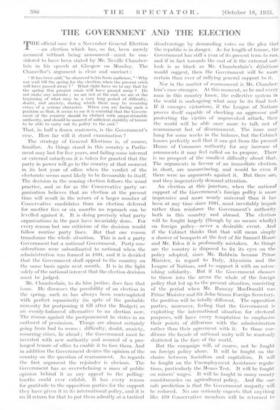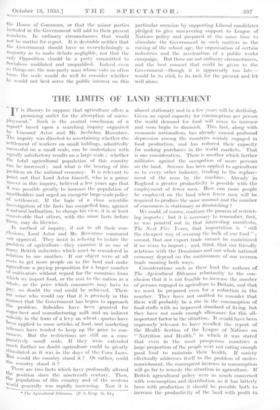THE GOVERNMENT AND THE ELECTION
THE official case for a November General Election —an election which has, so far, been merely assumed without being announced—must be con- sidered to have been stated by Mr. Neville Chamber- lain in his speech at Glasgow on Monday. The Chancellor's argument is clear and succinct : " It has been said," he observed to his Scots audience, " Why not wait till the spring for the election, when the present crisis will have passed away ? ' What right have we to say that by the spring this present crisis will have passed away ? Do not make any mistake ; we arc not at the end, we are at the beginning of what may be a very long period of difficulty, doubt, and anxiety, during which there may be recurring crises of a serious character. When you are facing such a position as that, it seems to me it is essential that the Govern- ment of the country should be clothed with unquestionable authority, and should be assured of sufficient stability of tenure to be able to carry out its policy to the end."
That, in half a dozen sentences, is the Government's case. How far will it stand examination ?
The. strategy of General Eleetions is, of course, familiar. As things stand in this country a Parlia-
ment may last for five years, and failing some internal or external cataclysm it is taken for granted that the party in power will go to• the country at that moment in its last year of office when the verdict of the electorate seems most likely to be favourable to itself. The decision in the coming election follows the usual practice, and so far as the Conservative party or- ganisation believes that an election at the preSent time will result in the return of a larger number of Conservative candidates than an election deferred for another five or six months no reproach can be levelled against it. It is doing precisely what party organisations in the past have invariably done. For every reason but one criticism of the decision would follow routine party lines. But that one reason transforms the whole situation. This is not a party Government but a national Government. Party con- siderations were subordinated to national when the administration was formed in 1931, and it is decided that the Government shall appeal to the country on the same basis again next month. It is in the light solely of the national interest that the election decision must be judged.
Mr. Chamberlain, to do him justice, does face that issue. He discusses the possibility of an election in the spring, such as has always been contemplated with perfect equanimity (in spite of the probable necessity for postponing it till after the Budget) as an evenly-balanced alternatiVe to an electiOn now. The reason against the postponement he states in an outburst of pessimism. Things are almost certainly going from bad to worse ; difficulty, doubt, anxiety, recurring crises, lie ahead ; the Government must be invested with new authority and assured of a pro- longed tenure of office to enable it to face them. And in addition the GoVernment desires the opinion of the country on the question of rearmament. As regards the first argument the rejoinder is obvious. The Government has as overwhelthing a Mass of public opinion behind it as any appeal to the polling- booths could ever exhibit. It has every reason for gratitude to the opposition parties for the support they have given it in its international policy, and it is an ill return for that to put them adroitly at a tactical
disadvantage by demanding votes on the plea that the republic is in danger. As for length of tenure, the Government has still a year of its present term to run, and if in fact towards the end of it the external out- look is as black as Mr. Chamberlain's dyititisme would suggest, then the Government will be more certain than ever of rallying general support to it.
Nor in the matter of rearmament is Mr. Chamber- lain's case stronger. At this moment, as he and every man in this country know, the collective system in the world is undergoing what may be its final test. If it emerges victorious, if the League of Nations proves itself capable of checking an aggressor and protecting the victim of unprovoked attack, then the world will be able once more to talk not of rearmament but of disarmament. The issue may hang for some weeks in the balance, but the Cabinet knows perfectly well that it can get from the present House of Commons authority for any increase of armaments it may feel called on to propose. There is no prospect of the smallest difficulty about that. The arguments in favour of an immediate election, in short, are unconvincing, and would be even if there were no arguments against it. But there are, and they imperatively demand attention.
An election at this juncture, when the national support of the Government's foreign poli'ey is more impressiVe and more nearly universal than it has been at any time since 1931, must inevitably impair rather than reinforce the Government's authority both in this country and abroad. The election will be fought largely (though by no means wholly) on foreign policy—never a desirable event. And if the Cabinet thinks that that will mean simply a shower of bouquets at the feet of Sir Samuel Hoare and Mr. Eden it is profoundly mistaken. As things are the country is disposed to fix its eyes on the policy adopted, since Mr. Baldwin became Prime Minister, in regard to Italy, Abyssinia and the League of Nations, and to support it with an aston- ishing solidarity. But if the Government chooses to throw into the arena the whole of the foreign policy that led up to the present situation, consisting of the period when Mr. Ramsay MacDonald was Prime Minister and Sir John Simon Foreign Secretary, the position will be totally different. The opposition parties, moreover, feeling that the GovernMent is exploiting the international situation for electoral purposes, will have every temptation to emphasise their points of difference with the administration rather than their agreement with it. In those con- ditions the facade of national unity will be wantonly shattered in the face of the world.
But the campaign will, of course, not be fought on foreign policy alone. It will be fought on the choice between Socialism and capitalism. It will be fought on the Unemployment Assistance regula- tions, particularly the Means Test. It will be fought on miners' wages. It will be fought in many county constituencies on agricultural policy. And the one safe prediction is that the Government majority will be reduced. No one seriously expects that anything like 470 Conservative members will be returned to
the House of Commons, or that the minor parties included in the Government will add to their present numbers. In ordinary circumstances that would not be matter for regret. It is desirable neither that the Government should have so overwhelmingly a majority as to make debate negligible, nor that the only Opposition should be a party committed to Socialism undiluted and unqualified. Indeed, even US things are, the non-party man whose vote so often turns the scale would do well to consider whether he would not best serve the public interest on this particular occasion by supporting Liberal candidates pledged to give unwavering support to League of Nations policy and prepared at the same time to stimulate the Government in such matters as the raising of the school age, the organisation of certain industries and the acceleration of a public works campaign. But these are not ordinary circumstances, and the best counsel that could be given to the Government—though it is apparently too late— would be to stick to its task for the present and let well alone.



























































 Previous page
Previous page